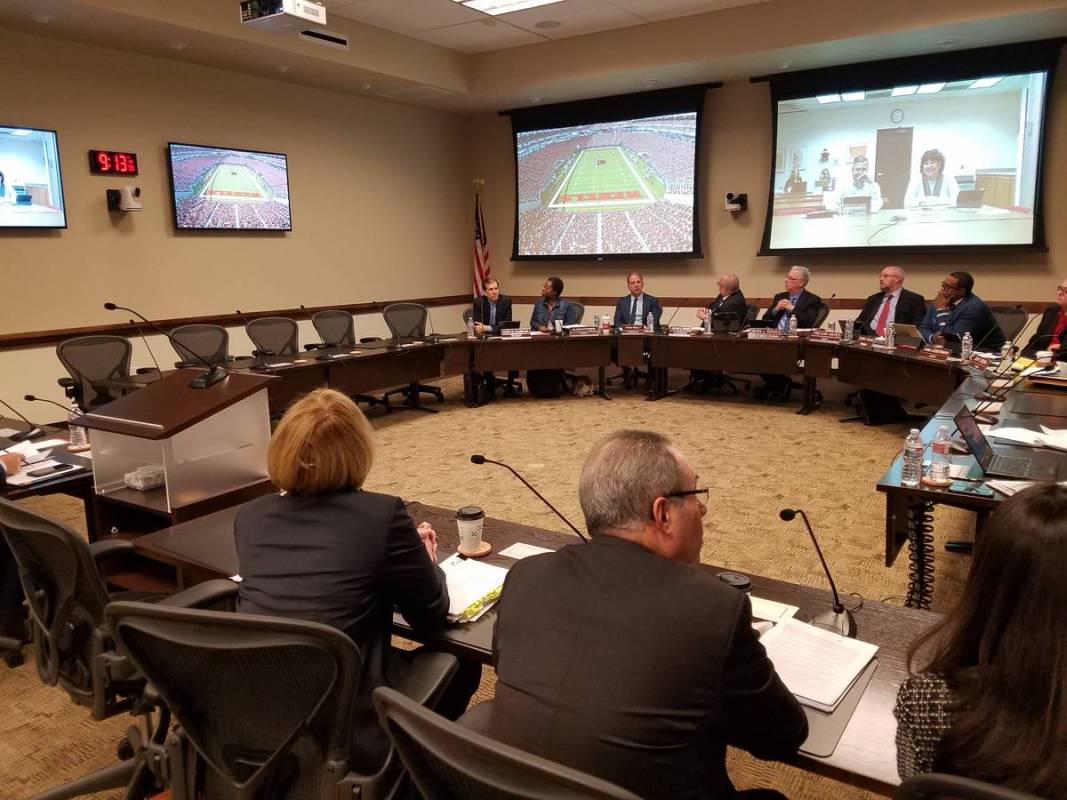
Nevadans will have a total of five statewide ballot questions to consider on the 2020 general election ballot, all of which propose amendments to the Nevada State Constitution.
Each of the questions was introduced by the Nevada Legislature in 2017 and passed by Nevada lawmakers in both 2017 and 2019. Now, these matters are in the hands of voters, who will ultimately decide if they become incorporated into the state constitution.
In this five-part series, the Pahrump Valley Times will delve into the details of each question, including the arguments advocating for and opposing passage of each, as written by the committees appointed for that purpose.
Board of Regents
A highly complex and controversial matter, Question 1 proposes an amendment to the Nevada State Constitution which would remove the constitutional status of the Nevada State Board of Regents and place its governance under the control of the Nevada Legislature.
The information provided by the Nevada secretary of state’s office on Question 1 encompasses a total of eight pages, double the amount used to detail all other statewide ballot questions, with the exception of Question 6. The arguments for and against passage are both lengthy, going into a variety of different points and citing various laws and court rulings as their basis.
The argument for passage of Question 1 begins by asserting that Nevada is the only state in which a single elected board with constitutional status controls and manages the affairs and funds of the state’s entire public higher education system. As such, the Board of Regents is essentially allowed to operate without oversight.
“In past cases before the Nevada Supreme Court, the Board of Regents has asserted that its ‘unique constitutional status’ gives it ‘virtual autonomy and thus immunity’ from certain laws and policies enacted by the Legislature,” the argument advocating for passage reads. “Based on legislative testimony, such assertions have given some people the impression that the board conducts itself as a fourth branch of government, and that the board too often invokes its constitutional status as a shield against additional legislative oversight and accountability.”
The argument for Question 1 goes into the financial side of the issue as well, stating that while the Legislature is required to provide financial support for the operation of the state university, the Board of Regents has sole control over how that funding is used. “This divide between the Legislature’s constitutional power to fund higher education and the board’s constitutional power to direct how those funds are actually spent gives the board a virtually unparalleled power… without the same level of legislative oversight typically applied to other executive branch agencies.”
Several other arguments are put forth, including those regarding complaints made to the Legislature about the Board of Regents and financial liabilities apparently created by the board’s management of the higher education system, among others.
On the opposite side of the argument, the committee against the passage of Question 1 contends that there was a very good reason for the Board of Regents’ inclusion in the constitution and that was to protect it from the ever-fluctuating influence of politics.
“In 1864, the framers of the Nevada Constitution made a deliberate choice to give constitutional status to the Board of Regents to guarantee that it had independent powers to control and manage the state university without the threat of political interference by the Legislature and governor,” the argument against passage states.
The argument in opposition continues by proclaiming that the Board of Regents is not free from legislative oversight. “When deemed necessary in court cases and legislative inquiries, the board has legitimately asserted its constitutional status because the board has a duty to defend the framers’ intent to protect the state university from unwarranted intrusions by the political forces of government,” the argument against explains, later continuing, “Passage of this ballot question would allow the Legislature to change existing higher education policies and procedures and even allow the Legislature to make members of the board appointed rather than elected. Previous attempts to change higher education governance have failed because Nevadans recognize the importance of keeping the system in the Nevada Constitution as originally drafted.”
To review the digest as well as the full arguments in favor and against each ballot question visit www.nvsos.gov and click on the “Elections” link, followed by the “2020 Petitions” link.
Contact reporter Robin Hebrock at rhebrock@pvtimes.com